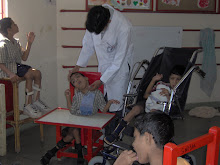How did you get into the field?
My association with child psychology dates back to the early 1960’s when, as a PUC student, I first read the works of (Sigmund) Freud. In 1962 I joined the National Institute of Mental Health, which was then the only institute offering a course in clinical psychology. I have been practicing psychology since 1965. I then did a stint at the University of Edinburgh where I was dealing with both adolescents as well as patients who had psychiatric problems. When I came back to India in 1976 I was again dealing with adults who had psychiatric problems. At that time we were counseling 1000 disabled and around 1000 patients with psychiatric problems a year. But then I suddenly realized that we were only seeing patients who were already diagnosed with a problem, no one was doing anything for the thousands of children in schools who needed help. So since the 1980’s I’ve been actively involved with child psychology at the school level.
In Dentistry, even though child psychology is a part of the curriculum, many dentists shy away from it. What do you think is the cause?
It’s not just dentistry; you find the same is the case with medicine. And it’s not just India, even in the United States pediatricians shy away from psychology. Over the years things have only gotten worse. In the old days, a bedside manner was a very important part of a doctor’s armamentarium. They may not have applied classic theories of psychology but they followed one of the most important principles; “talk to your patient”. I can give you the example of bed wetting. Most doctors who are faced with a child who is bed wetting place the child on medication without making the effort to find out what stress the child is under and talking to the child and finding out what is bothering him.
So if you had to give a piece of advice to doctors in general what would it be?
Talk to your patients. Psychology is much more than knowing a few theories. It is a knack that you pick up. Communication with the child is the most important practical aspect of child psychology. Unfortunately in most places rules exist for the comfort of the doctor or the dentist. No one wants to put the child at the center of the problem. I am reminded of a very beautiful quote by Anna Freud, who was a teacher who extensively applied Freud’s theories to children;
“You have to insinuate yourself into the child’s affection, become an ally of the child and only then can you treat the child.”
Make your approach child centered. Don’t be scared to come down to the level of the child or even play with the child. A box of toys in your office may not cost much but they will go a long way in making a child your ally. The true application of child psychology lies in using its principles to make the child comfortable. It is not enough to know that children have an innate fear of separation or a fear of the unknown. Using techniques to overcome these fears is the true application of psychology.
What about children with special needs?
I feel that a child with special needs is just a younger child. A mentally retarded child of 10 would be as cooperative as a child of 2. If the doctor is able to judge the mental age of the child, he will find that the principles psychology apply to them just as they would apply to any other child. What happens with autistic children for example is that doctors have this urge to sedate them. It may not always be necessary. Talk to them, try to communicate, you may still fail in certain severe cases and may have to resort to sedation, but you have to make the effort.
So if you had to pick a theory of psychology that was most applicable to Indian Children which theory would it be?
I would say that to be effective you need to employ a judicious mixture of cognitive and behavioural techniques. No one theory can be said to be most applicable. In fact if you were to ask me the one thing you could do to effectively counsel a child it would be to make the child the center of the whole process. The same holds true for our schools we should put the child at the center of our education system, instead of making marks the sole purpose of an education.
You are passionate about bringing psychology to the level of the schools...
Yes. You see we tend to view psychology as a treatment for a disorder, no one realizes that every normal child goes through certain psychological problems. There are over 500 schools in Bangalore today, yet no one caters to them. It is only when you talk to teachers and train them to identify signs of disorders such as attention deficit and hyperactivity can you really begin to help children.
On the topic of attention defecit, what do you make of the recent increase in ADHD cases in India?
ADHD is being diagnosed in a lot of children these days, In fact over the last few years there have been several MPhil and PhD theses on the topic at NIMHANS. Anyone who wishes to treat a child with ADHD must realize that it is both a behavioural problem as well as a response to a psychosocial problem. It must be remembered that even if your patient is on medication, the medication only treats the hyperactivity, it does not treat the attention deficiency. It is important to recognize the activity that engages the child. This could be in the form of playing, coloring or music. In fact in rural areas we suggest sorting of different types of grain, anything to keep the child occupied. And you will find the child's attention improving. For dentists I can suggest Hand puppets. You have a colorful hand puppet that depicts the teeth and you show the procedure you are about to perform on the puppet and you will find that the child automatically becomes interested in the puppet, and therefore the procedure
So you are not for medicating the child?
It is not that i am am for or against medication, the correct diagnosis is very important. For example out of a class of 300 students, the teachers referred 10 children to us with suspected ADHD. Only 1 of the 10 actually had ADHD. And this problem of accurate diagnosis exists worldwide. In the UK for example, doctors are reluctant to medicate a child and do not diagnose many cases of ADHD, whereas in the US there is a tendency to over diagnose the condition and thus we have an increased number of children placed under medication. Judicious use of medication can reduce the hyperactivity, but i still maintain that an activity that engages the child is the only cure for the attention deficit.
So where do you see the field of child psychology in India?
I'm afraid that like much of our education sector, special ed in India is a money making venture. Except for the little work that is being done in the government hospitals, there is little else being done either for normal children who need guidance or for children with special needs.
Professor Kapur runs a free clinic for the diagnosis and management of children with Attention Disorders, Behavioural Problems and Learning Disability from 2pm to 5pm on Saturdays (except for major holidays) and can be contacted at;







2 comments:
I totally agree with Professor Kapur. Individuals in professions related to children should not only have child psychology in their cirriculum, but also should understand and apply it on regular basis. Psychology is just made to look like a tough subject when it is actually understanding urself and others aroud u.
Dr.Uma said....
In this fast paced era we very often forget what Anna Freud said.In our eagerness and hurry to treat the child we often forget the psyche of the little one and label him uncooperative!
Post a Comment